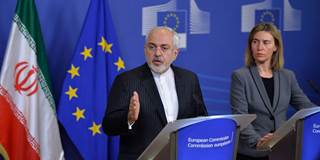Since President Donald Trump withdrew the United States from the 2015 Iran nuclear deal, European firms and banks have risked incurring US sanctions if they do business with the Islamic Republic. Fortunately for European leaders, who are eager to engage with Iran to keep the deal alive, a solution can be found in Europe's recent past.
BERKELEY – US President Donald Trump’s unilateral withdrawal from the 2015 Iran nuclear deal – formally known as the Joint Comprehensive Plan of Action – has put Europe in a bind. Its governments remain committed to economic engagement with Iran as a way to encourage compliance with the JCPOA, which means providing not just humanitarian assistance, but also other goods. Firms supplying these exports, however, risk incurring sanctions from the Trump administration.
For the same reason, European banks are reluctant to provide euros to finance trade with Iran. And US banks, for their part, are prohibited from providing dollars. Collectively, these obstacles constitute a formidable barrier to the sought-after engagement.
In response, France, Germany, and the United Kingdom, the three European signatories to the nuclear deal, have established a mechanism for conducting trade with Iran independent of the United States. That mechanism, the Instrument in Support of Trade Exchanges, or Instex, is registered in France and reports to a supervisory board of diplomats from the three countries.

BERKELEY – US President Donald Trump’s unilateral withdrawal from the 2015 Iran nuclear deal – formally known as the Joint Comprehensive Plan of Action – has put Europe in a bind. Its governments remain committed to economic engagement with Iran as a way to encourage compliance with the JCPOA, which means providing not just humanitarian assistance, but also other goods. Firms supplying these exports, however, risk incurring sanctions from the Trump administration.
For the same reason, European banks are reluctant to provide euros to finance trade with Iran. And US banks, for their part, are prohibited from providing dollars. Collectively, these obstacles constitute a formidable barrier to the sought-after engagement.
In response, France, Germany, and the United Kingdom, the three European signatories to the nuclear deal, have established a mechanism for conducting trade with Iran independent of the United States. That mechanism, the Instrument in Support of Trade Exchanges, or Instex, is registered in France and reports to a supervisory board of diplomats from the three countries.